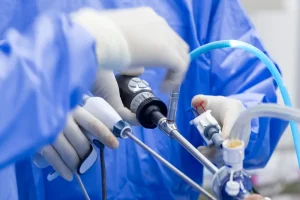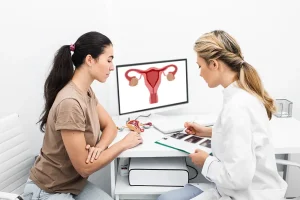Conditions Treated
Gynecologic Diseases
- Uterine fibroid
- Ovarian cysts
- Pelvic adhesions
- Endometriosis
- Bartholin's gland abscess or vaginal cyst
- Pelvic organ prolapse
- Tubal factor infertility
- Abnormal uterine bleeding
Oncologic Conditions
- Cancer staging
- Omentectomy
- Pelvic and periaortic lymphadenectomy
- Ovarian preirairairadiere ovarian transposition

Living with persistent pelvic pain, irregular bleeding, or the uncertainty of a gynecologic condition can be overwhelming. When your health can’t wait, you can find expert surgical care at VenArt Clinic.
As a private gynecology clinic, we specialize in advanced surgery and oncology, offering minimally invasive procedures designed to protect your reproductive health. Thanks to our highly experienced private gynecologists and innovative medical techniques, we provide a surgical experience of the highest standards, with exceptional long-term results that enable you to move forward with confidence and peace of mind.
What Is Gynecologic Surgery?
Gynecologic surgery treats conditions affecting the female reproductive organs, including the uterus, ovaries, fallopian tubes, and vagina. At VenArt Clinic, we offer advanced, modern solutions, including laparoscopic and oncologic procedures, to help you recover quickly and feel your best.
Gynecologic Conditions
Explore some of the most common issues our private gynecologists diagnose and treat using minimally invasive techniques:
- Uterine fibroid: Benign tumors that develop in the muscular wall of the uterus, often linked to heavy bleeding or pain;
- Ovarian cysts: Fluid-filled sacs on the ovary;
- Pelvic adhesions: Fibrous tissue formed between the pelvic organs, causing chronic pain and infertility;
- Endometriosis: Endometrial tissue formed outside the uterus, causing inflammation and potential fertility issues;
- Bartholin’s gland abscess or vaginal cyst: Painful swelling near the vaginal opening due to infection or blockage of the Bartholin’s gland;
- Pelvic organ prolapse: Descent of the uterus or vaginal walls due to weakened pelvic support structures;
- Tubal factor infertility: A condition where the fallopian tubes are blocked or damaged;
- Abnormal uterine bleeding: Conditions that may require uterine tissue sampling to evaluate for hormonal imbalances, polyps, or cancer.
Oncologic Conditions
- Breast cancer and other cancers of the genital tract;
- Spread of cancer to areas like the omentum or lymph nodes;
- Prevention of ovarian damage from radiation.
Gynecologic, Oncologic and Breast Surgery
With accurate preoperative evaluation, individualized treatment plans, and cutting-edge technologies, we can help you navigate a wide array of conditions — from cancers to infertility issues.
Gynecologic Procedures
Whether to preserve fertility or relieve pain, our gynecologic treatments are tailored to your needs.
- Tubal sterilization: A permanent contraceptive method to prevent pregnancy;
- Laparoscopic ovarian cyst removal: Recommended for ovarian cysts larger than 6 centimeters that persist for more than two menstrual cycles;
- Laparoscopic pelvic organ prolapse repair: Corrects and treats uterine or vaginal vault prolapse by suspending the affected organs using a special mesh made of biocompatible material;
- Laparoscopic adhesiolysis: Removes abnormal fibrous tissue or adhesions to improve fertility;
- Laparoscopic myomectomy: Removes benign uterine fibroids while preserving the uterus and helping maintain reproductive function;
- Laparoscopic excision of endometriosis: Removes endometrial tissue to relieve symptoms and improve;
- Biopsy curettage: Diagnoses suspicious pathology by obtaining samples of uterine tissue;
- Chromopertubation: Evaluates uterine fallopian tube patency to diagnose infertility.
Oncologic Procedures
Learn about the specialized oncologic procedures we perform to help you heal.
- Cancer staging: Laparoscopic assessment to determine the stage of disease and plan treatment;
- Omentectomy: Removal of the momentum to evaluate the extent of the cancer;
- Pelvic and periaortic lymphadenectomy: Removal of affected lymph nodes for precise treatment;
- Pre-irradiation ovarian transposition: Protection of ovarian function by moving the ovaries out of the irradiated area.
Breast Surgery Procedures
Our comprehensive breast care services include diagnostics and surgical interventions to support you long-term.
- Breast screening via ultrasound;
- Elastography;
- Specialized consultations;
- Image-guided biopsies;
- Breast lump removal;
- Breast sector removal;
- Mastectomy;
- Mastectomy with lymphadenectom
Advantages of Minimally Invasive Gynecologic Surgery
Laparoscopic procedures offer a safer, gentler alternative to traditional surgery, offering the following benefits.
- Rapid recovery and healing: With short hospital stays required and low risk of complications, you can resume normal daily activities within a few days;
- Safe across all life stages: Suitable for any age and, depending on the procedure, even during pregnancy or breastfeeding;
- Efficient treatment: Procedures last between 30 and 90 minutes, depending on their complexity;
- Less scarring: Incisions are very small, between 0.5 and 1 centimeter, which means you don’t have to worry about unsightly scars;
- Comfort-focused care: Interventions are performed under general anesthesia to ensure your comfort
Advanced Technologies and Precision Diagnostics
At VenArt Clinic, accurate diagnosis is a priority. To ensure we stay precise at every stage of care, we rely on advanced medical technologies:
- Ultrasound and elastography: Non-invasive imaging techniques that allow for early detection of conditions;
- Image-guided breast punctures: A targeted diagnostic method that brings fast and accurate diagnosis;
- Advanced laparoscopy: A minimally invasive approach used for both diagnostic exploration and surgical treatment.
Why Choose VenArt Clinic?
Trusted expertise, advanced technology, and care that puts you first — learn more about what sets our gynecology clinic apart:
- Internationally renowned doctors: Our medical team includes specialists trained in top clinics across Europe and the USA, bringing world-class expertise to every procedure;
- State-of-the-art technologies: We use the latest medical equipment and imaging tools for accurate diagnoses and safe, effective treatments;
- Personalized care: No two patients are alike. Your care plan is thoughtfully designed around your health goals, preferences, and unique medical needs;
- Minimally invasive procedures: We focus on techniques that reduce discomfort, speed up recovery, and give you a renewed sense of confidence.
Our Medical Team
Meet the dedicated team of private gynecologists who will support you throughout your journey.
- Harșa Radu: With over 10 years of experience in laparoscopic surgery, infertility treatment, and assisted reproduction, Dr. Radu is a primary care physician specializing in obstetrics and gynecology;
- Ildiko Bartok: A primary specialist in obstetrics and gynecology, Dr. Bartok focuses on peri-menopause care, aesthetic gynecology, and regenerative medicine;
- Călin Todoran: A primary care obstetrics-gynecology physician, Dr. Todoran specializes in oncological gynecology, hormone replacement therapy, aesthetic gynecology, and integrative medicine.
Frequently Asked Questions
When should I book a gynecology appointment?
You should see your private gynecologist for:
- Routine checkups (once a year);
- Pelvic pain;
- Abnormal bleeding between periods;
- Menstrual problems (irregular, painful periods);
- Pregnancy or family planning;
- Genital infections or symptoms, such as itching, burning, or abnormal discharge.
What is a Pap test, and how often should it be done?
The Pap test detects cell changes in the cervix, including those that can lead to cancer. It is recommended every 3 years for women ages 21 to 65, or as directed by your doctor, depending on the results.
What causes irregular periods?
Potential causes of irregular menstrual cycles include:
- Hormonal imbalances;
- Polycystic ovarian syndrome (PCOS);
- Stress or major lifestyle changes;
- Uterine fibroids;
- Pregnancy.
What is the HPV vaccine?
The HPV vaccine protects against infection with the human papillomavirus (HPV), the main risk factor for cervical cancer and other cancers associated with HPV.
What is polycystic ovarian syndrome (PCOS)?
PCOS is a hormonal condition affecting the ovaries, characterized by irregular menstrual cycle, cysts on the ovaries, and an excess of male hormones (acne, facial hair growth). Treatment includes lifestyle changes, medication to regulate the menstrual cycle, or fertility.
What are uterine fibroids, and how are they treated?
Uterine fibroids are benign growths that occur on the uterus. Heavy periods, pelvic pain, and infertility are common symptoms. Treatment ranges from medication to surgery, such as myomectomy.
What is a vaginal infection, and how do I recognize it?
Vaginal infections can be caused by bacteria, fungi or viruses. Symptoms include abnormal discharge (color, odor), vaginal itching or burning, and pain during urination. Diagnosis and treatment depend on the type of infection.
How can I prevent vaginal infections?
For prevention, observe these tips:
- Maintain proper intimate hygiene;
- Avoid douching;
- Use cotton underwear;
- Avoid using scented products in the intimate area;
- Adopt a healthy lifestyle.
What contraceptive options are available?
Contraceptive methods include:
- Birth control pills;
- Intrauterine device (IUD);
- Condom;
- Vaginal ring;
- Contraceptive implant;
- Permanent sterilization.
Your doctor will recommend the right method according to your needs.
What symptoms can indicate pregnancy?
Early symptoms include:
- Delayed menstruation;
- Nausea or vomiting;
- Excessive tiredness;
- Tender breasts;
- Increased frequency of urination.
A pregnancy test confirms the diagnosis.
What is menopause, and what are its symptoms?
Menopause is the natural end of menstruation, usually after the age of 45 to 50. Symptoms include:
- Hot flushes;
- Sleep disturbances;
- Mood changes;
- Decreased bone density.
Consulting a private gynecologist can help manage symptoms.







